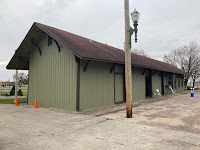Frank writes...
Sunday was the last day of the regular operating season. It was chilly and overcast, so although there was no rain it didn't seem terribly busy in terms of visitors. The 4000s on the main line and the 415 on the car line closed out what has unquestionably been the strangest regular season in a long time.
Zach was working on trolley poles all day. It's always good to have a couple of spares on hand in case they're needed, so he was cleaning up and painting poles from stock for this purpose. At the end of the day he was also installing new trolley harps. Maintenance work like this isn't very exciting but it sure is vital to keep the trains running. Other projects were being worked on too, of course, including Greg, Dan, and Good Nick working more on disassembling the first Toronto CLRV truck.
I stopped by the steam shop to talk with Tom about tracing some lettering off of an upcoming project. On Saturday there was a big switch move that saw the entire steam shop track pulled and rearranged. Among other things, this means that GN&A 26, one of our Moguls, is now no longer at the south end of the steam lead and that it has been reunited with its tender for the first time in many years. The space south of the drop table, where the 26 and the little air-start roller skate have been sitting, is now occupied by the Burlington scale test car and a storage reefer.
Inside the steam shop, the 428 is now at the south end; next is Public Service 7 (shown), which is getting a new pilot beam and some cosmetic work; and then are the Shay and the 1630.
I also picked up some more items from the Stephen Scalzo Collection to catalog, some of which may show up on the blog in coming weeks (stay tuned!), and while we were at it Richard showed me the new bus. Last weekend IRM was given this vintage-2001 low-floor bus from Janesville. What can I say?
I spent most of the day working on one of our parts storage areas, sorting and trying to consolidate stuff. A lot of what was in this area were random parts from Trolleyville that had been thrown into big wire crates and haven't been sorted since they arrived in 2010. One of the more unusual finds was this trolley base, made by the Holland Trolley Supply Company of Cleveland and apparently patented in 1908. It's got a bit cast ring that bolts to the car and the pole support sticks straight up. It looks like it's designed to "flop over" and work in either direction but I'm not certain why that would be helpful, unless you were using a bow trolley I guess. I've certainly never seen anything quite like this and don't know what car it might have been used on. Anyone know more about this design?







No comments:
Post a Comment